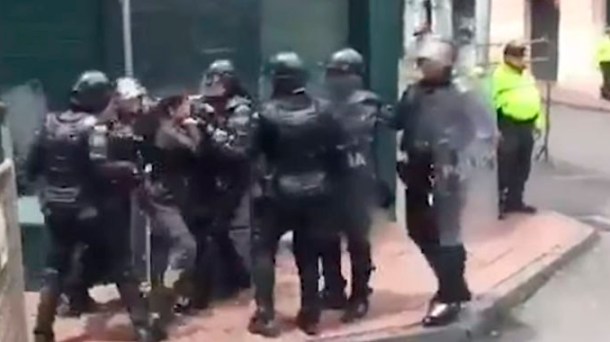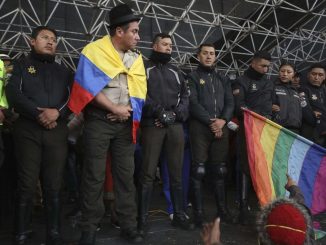
There are figures and testimonies of injured people, detainees who suffered blows and were released without charge against them, as well as relatives of the deceased people.
“They put a plastic case so he doesn’t see where he was being directed. They made him go down on a bridge, they said: “you want to live or die.” This is one of the testimonies included in the report presented by the Alliance of Human Rights organizations on the national strike. In it, “serious violations of rights committed, mainly by state agents,” are indicated as part of the 11 days of protests.
“They put a plastic case so he doesn’t see where he was being directed. They made him go down on a bridge, they said: «you want to live or die.» He was hit again and forced to answer specific questions about his participation in the strike. After agreeing to collaborate, he was put on patrol, but he fell silent again, and at that moment he was shot and the impact was received by his cell phone. Then, he answered some questions. Finally, they arrived at El Ejido Park, they took their data and after beating and threatening him, they released him.” Indigenous leader detained on October 9 in the Center of Quito.
The report concluded that mobilizations took place in the midst of excessive, disproportionate and violent use of the public force (National Police and Armed Forces) against citizens that were mostly peaceful. The Alliance was able to register serious violations of the rights to life, human dignity, integrity in relation to other rights.
“J.S. was protesting near Carapungo, then he went home with his cousin. Around 5 pm, the police entered the home without any order or competent authorization and both were severely hit.” His detention took place between October 3 and 4. It was formalized at the Flagrancy Unit.
The Alliance confirmed that mass repression acts -deployed under a state of exception and curfew- resulted in a violent escalation that left more than a thousand injured, eight deaths confirmed by this coalition, minor and serious injuries, people tortured, and more than a thousand detainees –449 reported to this Alliance. In addition, economic losses and exacerbation of racism and xenophobia in the country.
“They drove us all, they tied us up and in the center they threw us a bomb (tear gas) and the one who fell there fell to it with kicks or toletazos. The minors cried and rolled on the floor and the one who did not [exercise] toletazo, patazo and even were with a board. There were about 15 police officers, 4 women, they all laughed, they made fun of there … ”(K.A.T, his detention was on October 8. The hearing was for violation of public scandal. He apologized for release).
The Alliance verified that the right to personal liberty was also violated and during those arrests the right to integrity of hundreds of people nationwide. In this sense, it was possible to verify two serious practices. On the one hand, the deprivation of liberty of hundreds of people formalized before a judge and, on the other, arrests that were not formalized and that were accompanied by cruel, inhuman and degrading treatment.
“We were sitting with the car off, when a group of police officers approached us, surrounded us and began to break the glass of our car. One of them pointed a shotgun at my face, threatening to shoot me if I didn’t get out of the car. My brother and I are dragged out of the car, and begin to hit us on the ground and kick us among several policemen. We barely raised our heads a little, they kicked us […] and shouted at us not to try to see. After hitting us on the head, back and limbs, they put us on a patrol car and drove us around Quito for about 2 hours. They never made us a legal detention. It was not registered in any document… ”(S.M.H and A.M.H, brothers).
More than half of the detainees (55%) recovered their freedom without charge and another 16% accused of allegedly mistreating or insulting members of the public force, regained their freedom after they were conditioned to apologize to their apprehenders, without who have been able to impute the commission of a crime. They warn of the possibility that 71% of the detentions have been arbitrary, random and selective during repression and police prosecution operations.
Source: Pichincha Universal.




Be the first to comment